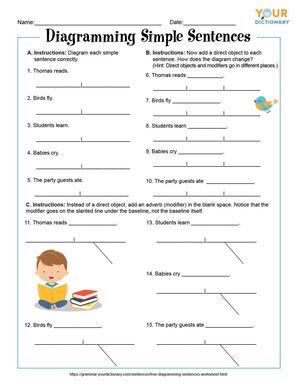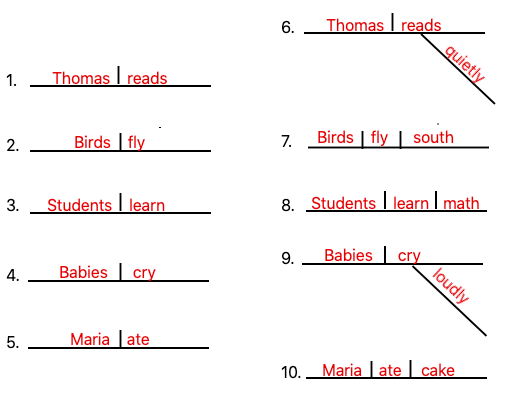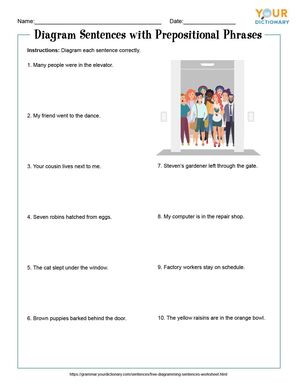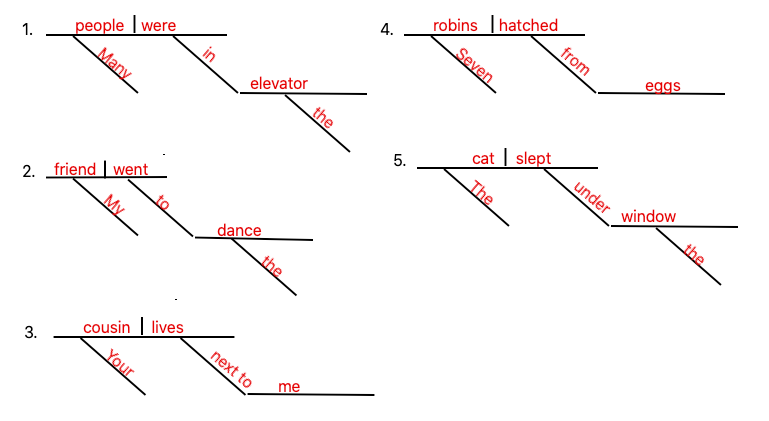

Diagramming sentences is useful to develop a deeper understanding of grammar and parts of speech. It reinforces that adjectives and adverbs must accompany the words they are modifying, and subjects and verbs must agree. Practice diagramming sentences with these diagramming sentences worksheets, and you’ll better understand how to break down a sentence into parts.
Diagramming Sentences Worksheet: Simple Sentences
When starting out with sentence diagramming practice, it’s best to start simple. Beginners can break down simple sentences into their subject and verbs before adding modifiers and other sentence parts. If you’d like to download a complete worksheet, click on the printable PDF below.

Simple Sentences Diagramming Practice
Diagram each simple sentence correctly.
1. Thomas reads.
2. Birds fly.
3. Students learn.
4.Babies cry.
5. The party guests ate.
Now add a direct object or modifier to each sentence. How does the sentence diagram change? (Hint: Direct objects and modifiers go in different places.)
6. Thomas reads quietly.
7. Birds fly south.
8. Students learn math.
9. Babies cry loudly.
10. Maria ate cake.
Simple Sentences Worksheet Answers
How did you do? Check your sentence diagrams here.

Diagramming Sentences Worksheet: Prepositional Phrases
Practice adding prepositional phrases and other sentence parts with more challenging sentence diagramming exercises. You can download a full worksheet for more sentence diagramming practice with the printable PDF below.

Diagram Sentences Prepositional Phrases worksheet
Click to View & DownloadPrepositional Phrases Diagramming Practice
Diagram each sentence correctly.
1. Many people were in the elevator.
2. My friend went to the dance.
3. Your cousin lives next to me.
4. Seven robins hatched from eggs.
5. The cat slept under the window.
Prepositional Phrases Worksheet Answers
Were those exercises more challenging than the first one? See how well you did on these sentences.

Why Diagram Sentences?
What’s the point of diagramming sentences if you already know how to write them correctly? When students know how to diagram sentences, they learn to do the following:
- identify parts of a sentence
- demonstrate the relationships of every word in the sentence
- visually track the subject and verb as the most important parts of the sentence
Diagramming sentences used to be a regular part of elementary and secondary grammar lessons. However, they are not as prevalent in modern grammar classes. When taught in a clear and engaging way, they can still be very beneficial to English language arts students of any age.
Tips for Diagramming Sentences
Even if you’ve never diagrammed a sentence before, you’ll find that the process is straightforward once you know what to do. The easiest way to start is to identify the parts of speech and the parts of the sentence. First, you need to:
Identify your subject (What is the sentence about?).
Identify your verb (What is the subject of the sentence doing?).
List any adjectives or adverbs (words or phrases that modify a subject, object or verb).
List any prepositional or modifying phrases (phrases that modify, or provide additional information, about something in the sentence).
Determine whether you have one independent clause or whether there is a dependent clause (Dependent clauses are clauses that can't stand alone.)
List interjections, articles, modifiers, and other parts of speech.
Once you have identified the different parts of the sentence and thought about how they fit together, it is easy to begin your diagram. For your first few sentences, it might be helpful to label each part of the sentence as you get the hang of sentence diagramming.
Your subject and verb go on your baseline, with a straight line between them.
Adjectives, adverbs, prepositional phrases, and modifying phrases go below your base line, on slanted lines below the thing they are modifying.
Dependent clauses have their own baseline, and the sentences are connected with dotted lines and the conjunction.
Diagramming sentences can be difficult at first, especially with complex sentences. However, it can help provide you with a deep understanding of grammar rules and parts of speech. The best way to get better at diagramming sentences is to practice.
More Parts of a Sentence Practice
Diagramming sentences is an effective way to reinforce the parts of a sentence, learn how they interact with each other, and demonstrate your understanding of grammar conventions. But diagramming sentences is just one way to practice proper sentence form. Once you’ve mastered sentence diagramming, try out seven cool grammar games for kids in the classroom. You can also work on action words in the sentence with ten fun verb games and activities.